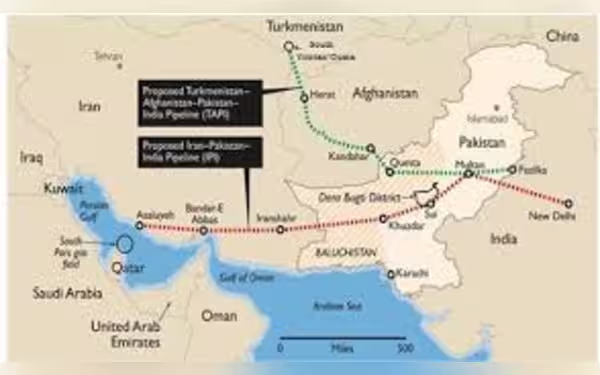Thursday, July 4, 2024 06:53 PM
Iran-Pakistan-India Pipeline: Regional Cooperation for Economic Growth
- IPI gas pipeline project reshaping Pakistan's economic landscape
- Informal trade channels thriving amidst strained India-Pakistan relations
- Need for enhanced formal trade mechanisms in evolving geopolitical dynamics
 Image Credits: ResearchGate
Image Credits: ResearchGateThe Iran-Pakistan-India gas pipeline project presents a transformative opportunity for regional collaboration and economic growth amidst evolving geopolitical dynamics and thriving informal trade channels.
The Iran-Pakistan-India (IPI) gas pipeline project, although facing challenges, remains a significant initiative in the region. With connectivity work completed on the Iranian and Indian sides, attention now turns to the remaining 300km stretch through Pakistan. Recent diplomatic shifts, including improved relations between Iran and Saudi Arabia, signal changing dynamics in the energy sector. This project holds the potential to reshape Pakistan's economic landscape, challenging historical divisions and colonial legacies.
Despite regional complexities, Pakistan stands poised to play a pivotal role in driving growth by facilitating energy supply and demand dynamics. The evolving economic landscape, marked by shifting alliances and emerging powers like India, Saudi Arabia, Iran, and Bangladesh, underscores the need for a fresh perspective on regional cooperation and development.
Recent events, such as the Pulwama attack, have strained trade relations between India and Pakistan. However, reports suggest that informal trade channels, including third-country routes and circular trade practices, continue to thrive. This informal trade, estimated to be significantly larger than official trade figures, highlights the resilience and adaptability of regional economies.
The Iran-Pakistan-India gas pipeline project represents a transformative opportunity for regional collaboration and economic growth. As geopolitical dynamics evolve, informal trade channels persist, underscoring the need for enhanced formal trade mechanisms. Embracing a new era of cooperation and connectivity will be crucial in unlocking the full potential of regional economies.













